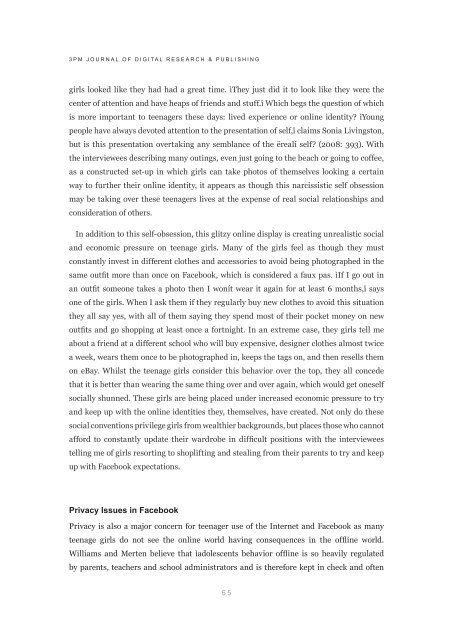3pm Journal of Digital research & publishing - artichoke web design
3pm Journal of Digital research & publishing - artichoke web design
3pm Journal of Digital research & publishing - artichoke web design
Create successful ePaper yourself
Turn your PDF publications into a flip-book with our unique Google optimized e-Paper software.
<strong>3pm</strong> <strong>Journal</strong> <strong>of</strong> <strong>Digital</strong> <strong>research</strong> & <strong>publishing</strong><br />
girls looked like they had had a great time. ìThey just did it to look like they were the<br />
center <strong>of</strong> attention and have heaps <strong>of</strong> friends and stuff.î Which begs the question <strong>of</strong> which<br />
is more important to teenagers these days: lived experience or online identity? ìYoung<br />
people have always devoted attention to the presentation <strong>of</strong> self,î claims Sonia Livingston,<br />
but is this presentation overtaking any semblance <strong>of</strong> the ërealí self? (2008: 393). With<br />
the interviewees describing many outings, even just going to the beach or going to c<strong>of</strong>fee,<br />
as a constructed set-up in which girls can take photos <strong>of</strong> themselves looking a certain<br />
way to further their online identity, it appears as though this narcissistic self obsession<br />
may be taking over these teenagers lives at the expense <strong>of</strong> real social relationships and<br />
consideration <strong>of</strong> others.<br />
In addition to this self-obsession, this glitzy online display is creating unrealistic social<br />
and economic pressure on teenage girls. Many <strong>of</strong> the girls feel as though they must<br />
constantly invest in different clothes and accessories to avoid being photographed in the<br />
same outfit more than once on Facebook, which is considered a faux pas. ìIf I go out in<br />
an outfit someone takes a photo then I wonít wear it again for at least 6 months,î says<br />
one <strong>of</strong> the girls. When I ask them if they regularly buy new clothes to avoid this situation<br />
they all say yes, with all <strong>of</strong> them saying they spend most <strong>of</strong> their pocket money on new<br />
outfits and go shopping at least once a fortnight. In an extreme case, they girls tell me<br />
about a friend at a different school who will buy expensive, <strong>design</strong>er clothes almost twice<br />
a week, wears them once to be photographed in, keeps the tags on, and then resells them<br />
on eBay. Whilst the teenage girls consider this behavior over the top, they all concede<br />
that it is better than wearing the same thing over and over again, which would get oneself<br />
socially shunned. These girls are being placed under increased economic pressure to try<br />
and keep up with the online identities they, themselves, have created. Not only do these<br />
social conventions privilege girls from wealthier backgrounds, but places those who cannot<br />
afford to constantly update their wardrobe in difficult positions with the interviewees<br />
telling me <strong>of</strong> girls resorting to shoplifting and stealing from their parents to try and keep<br />
up with Facebook expectations.<br />
Privacy Issues in Facebook<br />
Privacy is also a major concern for teenager use <strong>of</strong> the Internet and Facebook as many<br />
teenage girls do not see the online world having consequences in the <strong>of</strong>fline world.<br />
Williams and Merten believe that ìadolescents behavior <strong>of</strong>fline is so heavily regulated<br />
by parents, teachers and school administrators and is therefore kept in check and <strong>of</strong>ten<br />
65


